Dental Implants – Owasso, OK
Replacing the Entire Tooth, Roots and All
Traditional forms of tooth replacement don’t make up for the entire dental structure. They easily replace the crowns of the teeth, but the roots that used to be attached to the gums and the underlying bone go unaddressed. If you want to replace the whole tooth, roots included, then you have only one option: dental implants. Get in touch with Infinite Smiles Dentistry today to schedule a consultation to discuss replacing missing teeth with dental implants in Owasso, OK from Dr. Gaches.
Why Choose Infinite Smiles Dentistry for Dental Implants?
- Placement & Restoration in One Place
- A Patient-Oriented Approach
- Implementing the Latest Technology
What are
Dental Implants?
When the term “dental implants” is used, it’s usually referring to endosteal implants – small titanium posts shaped like screws. They’re made out of biocompatible metal so that they can fuse with the jawbone in a process called osseointegration. Implants keep the restorations attached to them permanently anchored in place, giving them additional strength and support that they wouldn’t have otherwise. The number of dental implants used depends on the number of teeth missing.
Benefits of Dental Implants

More than half a million dental implants are placed annually, making them one of the most popular solutions for tooth loss. Since they are surgically placed directly into the jawbone and naturally fused with their surrounding bone structure, implants can provide the best chewing power of any restoration and last for a lifetime if they receive excellent care. Here’s a brief guide to the many ways in which dental implants from our office in Owasso can improve your confidence, quality of life, and oral and overall health.
Day-to-Day Benefits

Dental implants can enhance your day-to-day life in ways such as:
- Providing the superior chewing power you need to enjoy tougher foods such as steak, raw fruits and veggies, and crunchy nuts and candies.
- Requiring no special dental hygiene measures. You’ll only need to brush, floss, and use antibacterial mouthwash regularly while keeping up with regular dental appointments to keep them in great shape.
- Completing your smile so you can proudly show off your grin to friends, family, and friendly strangers.
- Avoiding the embarrassment of having a dental restoration slip out of place while eating or speaking. Dental implants are surgically placed directly in the jawbone, giving them the sturdy hold they need to function just like real teeth.
Health Benefits

Dental implants can also help preserve your health in such remarkable ways as:
- Preserving the health of the jawbone by restoring the exercise it gets from the chewing process. This can prevent or even reverse the bone erosion that starts after tooth loss.
- Protecting the gum tissue from injury by food debris during the chewing process.
- Allowing the patient to enjoy a more nutritious and diverse diet while also helping them to chew thoroughly. This can help them avoid issues like malnutrition and indigestion.
- Easy hygiene and maintenance requirements help patients avoid painful and destructive oral infections like tooth decay and gum disease.
- Since dental implants hold themselves securely in the structure of the jawbone, the restorations they support won’t slide about in the mouth to cause painful irritation or dental injuries.
Long-Term Benefits

Dental implants represent an investment that can pay significant returns over their long lifespans. These include:
- A 95% success rate even after ten years since placement.
- Lasting for several decades or a lifetime if they receive excellent care.
- Being stain-resistant so they can remain beautifully white and shiny for the long haul.
- Opening up social and professional opportunities by giving patients the confidence they need to smile proudly to make excellent first impressions.
- Potentially saving patients thousands of dollars by lasting for decades so that they don’t need to worry about expensive replacement appliances like they would with traditional restorations like dentures or bridges.
Who Dental Implants Can Help

Dental implants are a versatile solution that can help you restore your smile regardless of how many natural teeth you have remaining, but that doesn’t mean they’re the best solution to meet everyone’s unique needs.
You must consult Dr. Gaches before proceeding to ensure you’re a good candidate. Continue reading to learn more about who dental implants can help so you can make an informed decision to replace missing teeth!
Who Is a Good Candidate for Dental Implants?
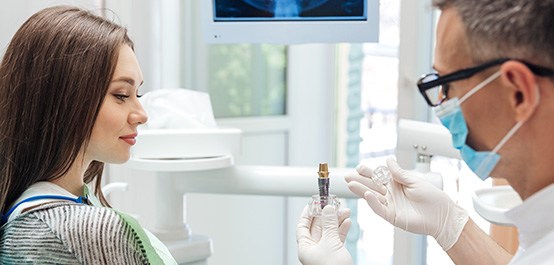
Potentially, anyone missing one or more teeth could benefit from these durable replacements. However, Dr. Gaches must examine your condition before approving your treatment to ensure you can undergo the procedure safely.
Different factors can impact whether you’re considered a good candidate, such as:
- Your general health condition. Because these restorations are placed in your jawbone, our team must update your medical history to determine whether your body is strong enough to undergo surgery.
- Your dental well-being. Common concerns, like cavities and gum disease, can potentially impact implant success and must be addressed first.
- Your jawbone density. The foundation of your mouth starts thinning after tooth loss, and if it’s too frail to support your prosthetics, you might require an additional bone graft procedure to build it back up.
Once our team has determined that you are a suitable candidate for dental implants, we will recommend one of the following options based on the number of teeth you have lost.
Missing One Tooth

A single rod can be placed in the space left behind by a missing tooth, which eventually fuses with your jawbone to function as a sturdy, standalone structure. Once your gums have recovered sufficiently, our team can provide a lifelike dental crown to cap it.
The end result is a beautiful new restoration that looks and functions more naturally than alternative solutions, such as dentures or dental bridges.
Missing Multiple Teeth
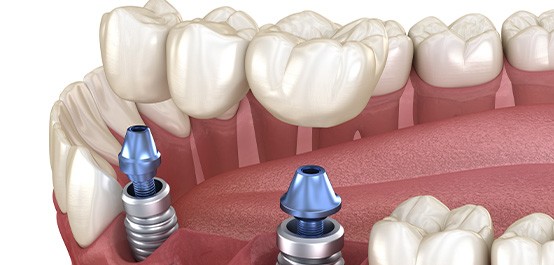
If you’ve lost one to four teeth consecutively, Dr. Gaches can rebuild your arch with an implant bridge. This treatment involves placing two posts into your jawbone on each side of the wider space in your smile.
Then, we can attach a customized dental bridge to these supports to bridge the gap. Your prosthetic will contain the required number of pontics (artificial teeth) positioned between two dental crowns, which will be cemented to your implants.
Missing All Teeth
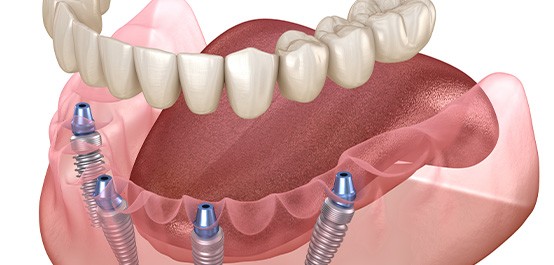
Patients who are missing all or most of their natural teeth may be ideal candidates for implant dentures. For this option, we’ll strategically place anywhere from four to eight dental implants into your arch. Once you’ve healed after the procedure, we can provide a complete set of specially designed dentures and anchor them securely in place.
The resulting restoration usually lasts longer and is more reliable than traditional dentures because it’s not intended to be removed and is unlikely to become destabilized or dislodged.
The 4-Step Dental Implant Process

Plenty of dental offices offer dental implants, but not all of them perform the placement surgery in-house; in many cases, you’d have to travel to see an offsite specialist for that portion of the treatment. Dr. Gaches has the training and skills necessary for both placing and restoring dental implants. That means no inconvenient trips to a separate dental office and no having to deal with a completely new team; you simply leave everything to the friendly staff at Infinite Smiles Dentistry. Here’s a brief look at the dental implant process.
Initial Dental Implant Consultation
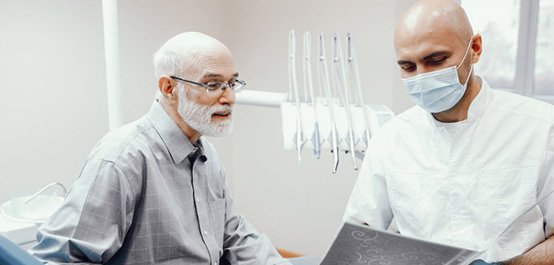
At the start of the process, you’ll first speak with Dr. Gaches so that we can determine if this treatment is a viable option for replacing your missing teeth. Not only will we take measurements of your jawbone, but we’ll also check to see if you’re free of any underlying complications that could prove problematic in the future, such as gum disease. If necessary, you may have to undergo preliminary services like periodontal treatment, bone grafting, or tooth extractions to ensure that your mouth is healthy and ready to get dental implants.
Dental Implant Surgery

Before beginning your procedure, we will first numb your mouth with a local anesthetic so that you don’t feel any pain during the process. We may likely provide you with sedation dentistry as well so that you can remain completely relaxed throughout your appointment. Dr. Gaches will then make a small incision in your gums to reach the jawbone underneath. He’ll then carefully place the titanium post(s) in the preplanned areas before suturing your gums closed. We will also place protective dental caps over your implants to keep them safe while you recover.
Dental Implant Osseointegration & Abutment
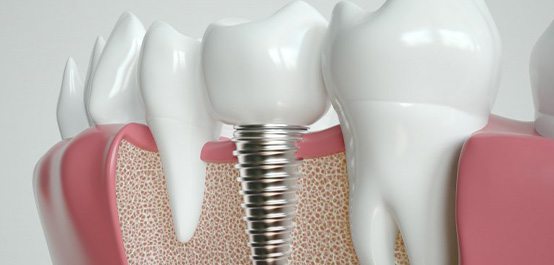
Your healing period should typically take around three to six months due to osteointegration. This is the process of the metal posts becoming fused with your jawbone, creating the incredibly lifelike foundation for your future restoration(s). Once your implants have become one with your bone tissue, you won’t expect your new pearly whites to move around, and you can enjoy a stable bite for a long time.
Once osseointegration is completed, you’ll return to our office to receive your abutments. These will be the small metal connector pieces that will link your restoration(s) to your implants. You’ll then be sent home for your gums to heal from this appointment.
Delivery of Dental Implant Restoration(s)

After you’ve recovered, you’ll come back to us for your new dental crowns, bridge, or denture. Our team will double-check that your results are satisfactory and that your bite is correct. If all looks well and you’re happy with your treatment, you’ll be free to go and show off your brand-new smile.
Understanding the Cost of Dental Implants

The cost of dental implants isn’t set in stone. It tends to vary quite a bit based on the number of teeth missing and the need for additional preparatory treatments. Insurance can also affect the amount you pay; implant placement may not be covered, but related treatments often are. Don’t forget that since dental implants don’t need to be replaced as often as traditional bridges and dentures, they can actually help you save money over the years.
Preliminary Treatments & Dental Implant Surgery

A component you may not have considered is if you need preliminary treatments. If you do, they will be included in the cost of your overall treatment. These can include tooth extraction, periodontal therapy, or even bone grafting.
Also, your dental implant surgery is an additional cost. Since we place and restore missing teeth in-house, you will not have to pay a separate fee to an outside implant dentist. Instead, it will be tied into the overall cost.
The Parts of Your Dental Implant

There are various parts of a dental implant that must be considered when formulating a cost estimate. These include:
- The number of dental implant posts needed – If you only need one implant post, you will pay much less than someone who needs implant dentures and requires 4-6 titanium posts.
- The materials used – Titanium and zirconia are the most common implant post materials. These each has their own cost, which will be factored in.
- The type of restoration needed – Depending on how many teeth you are missing, you will need either an implant crown, bridge, or denture. Naturally, a crown is much cheaper to produce than an implant denture.
- The brand – Various manufacturers make dental implants, but you can trust that our team works with those who only produce the highest quality because we want you to have a longer-lasting smile.
How Dental Implants Can Save You Money

Dental implants may be costly upfront but in the long run, you will save a lot of money. How? Here are just a few ways:
- Instead of buying denture adhesives or seeing a dentist for regular adjustments and replacements, you can avoid spending your hard-earned dollars and instead, receive dental implants.
- You’ll lower your risk of systemic issues commonly linked to tooth loss, such as osteoporosis, diabetes, and heart disease.
- You’ll enjoy a longer-lasting prosthetic that can remain firmly in place for a lifetime.
Does My Dental Insurance Cover Dental Implants?

Unfortunately, many dental insurance companies do not provide coverage for dental implants because they still view them as a luxury and not a medical necessity. However, for some, this is changing. Even if they do not cover the cost of your surgery, they may agree to cover your restoration or preliminary treatments.
Making Dental Implants Affordable

For uninsured individuals, we are pleased to offer two additional payment solutions that can help to lower out-of-pocket expenses. These include flexible financing through CareCredit, which carries no surprise fees. You can also take advantage of our in-house payment plan that requires you to pay one low fee to gain access to preventive care and available discounts on various services.
Dental Implant Post-Op Instructions
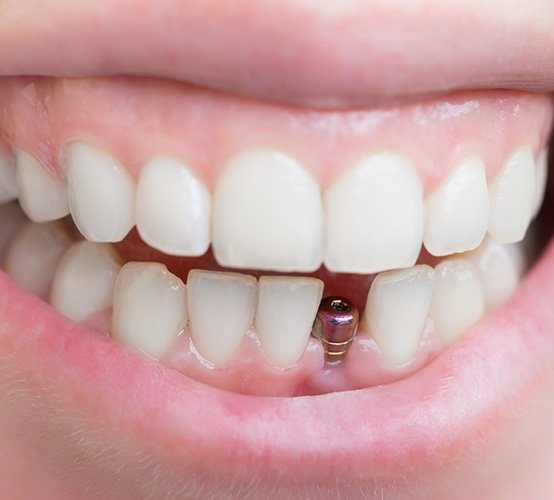
Dental implants are the best tooth replacement option out there. Because they replace the roots of the missing teeth, they allow for a wide range of additional benefits, including stability, comfort, and longevity. To achieve this, patients need to undergo a surgical procedure and recovery period. We will provide you with detailed instructions to help you heal as quickly and comfortably as possible. Here is what your instructions will probably look like.
What to Do Directly After Dental Implant Surgery

The most important priority during this time is to keep the blood clot that forms at the surgical site untouched. This is necessary for the process to go as smoothly as possible. Here are some of the rules that you should abide by to make this possible:
- Don’t spit! Use a tissue or swallow your saliva instead.
- Don’t use a straw when drinking liquids.
- Don’t smoke right away after your surgery.
- Keep your tongue and fingers away from the surgical site.
Common Side Effects When Recovering from Dental Implant Placement

Side effects are common during the dental implant recovery process. Here are some of the ones that patients commonly experience:
- Bleeding: Minor bleeding during the dental implant recovery process. This can be lessened with gauze and light pressure.
- Inflammation: For the first 72 hours following your procedure, you will probably encounter some inflammation. Use a cold compress to reduce this.
- Discomfort: Soreness is normal and common after dental implants placement. This can be managed with over-the-counter and/or prescribed pain relievers.
Your Diet After Dental Implant Surgery

After your surgery, it is key to stick to soft foods so you can give the area a chance to heal. Eating foods that are too tough can aggravate the surgical site. Here are some ideas of foods that you can enjoy:
- Scrambled eggs
- Mashed potatoes
- Pasta
- Soup
- Yogurt
- Oatmeal
- Apple sauce
- Pudding
- Ice cream
Post-Op Health & Oral Hygiene

The day after your surgery, brush your teeth as normal. However, you should be careful to avoid the dental implant site. To keep this area clean, gently rinse your mouth with salt water after meals. When you pick out a mouthwash, pick one that doesn’t contain alcohol because it can aggravate the dental implant site.
What to Do After Your New Teeth Are Attached

After you get your replacement teeth, the hard part is over! You could experience some minor sensitivity as your mouth adjusts to your new restoration, but this should be easy to manage at home. At this point, you shouldn’t run into any swelling, bleeding, or extensive recovery. If you have any questions or concerns about the healing process, give us a call so we can help.
Maintaining & Caring for Your Dental Implants

Dental implants can last for more than three decades or even the rest of your life. However, it’s crucial that you take all the proper steps to care for them. If you aren’t taking precautions to protect your dental implants from becoming damaged, they could fail and need to be replaced. The good news is that with just a few simple precautions, you can keep your implants healthy and enjoy their benefits for a long time.
Make Oral Hygiene a Priority

While dental implants are unable to get cavities, you still need to practice exceptional oral hygiene. In addition to keeping your surrounding teeth in excellent shape, sticking to an excellent oral hygiene routine can prevent other oral health issues, like gum disease, that can cause your implants to fail. Remember to brush twice, floss, and rinse with mouthwash every day.
Eat a Healthy Diet

One of the numerous benefits that you can experience from dental implants is the fact that you don’t need to deal with any eating restrictions. You can enjoy a nutritious meal without struggling to chew. Just remember that having too many items that are hard, sticky, or sugary can be problematic.
Break Bad Habits

Bad habits can cause your dental implants to fail. Refrain from smoking or using tobacco products immediately after your procedure. These items can slow down healing and increase your risk of developing an infection. Don’t use your teeth as tools either. You could accidentally end up damaging your dental implant or a surrounding tooth. Instead, find scissors or another tool that can help you complete your task safely.
Protect Your Dental Implants

As strong as your dental implants are, they aren’t completely indestructible. Always use a mouthguard to protect your dental implants and natural teeth when participating in sports. If you grind your teeth at night, ask about getting a nightguard to protect your implants and natural teeth from additional wear and tear.
Schedule Regular Dental Checkups

You should always attend your regular cleans and checkups every six months. This way, we can monitor your dental implants and spot any issues as early as possible. By catching potential problems now, you can prevent them from becoming more serious and leading to additional consequences, like failed dental implants.
Dental Implant FAQs
Are dental implants removable?
You cannot take out dental implants because they replicate the entire tooth structure, not just the crowns. A titanium post is surgically placed in the jawbone to serve as a root. Your bone will fuse to the implant through a process called osseointegration. After your jaw has healed, your dental implant can stay in place forever potentially. Although you can’t remove any posts, some implant dentures can be taken out for cleaning. Only a dental professional can take out the posts, such as in cases of failure.
How long do dental implants last?
Dental implants offer long-term results, so you’ll never have to worry about replacements. They are proven to last for 30 years or longer with the right maintenance, like brushing and flossing. Various factors will affect the lifespan of your new smile, like your commitment to your oral hygiene, lifestyle, and the location of the post. The back teeth undergo more pressure, so there can be a slightly shorter lifespan than implants used for the front teeth. You can ensure your investment thrives for decades by brushing, flossing, and using an antimicrobial mouthrinse. Your implant dentist in Owasso will recommend skipping any hard or chewy foods. It’s best to break any bad habits that might damage your dental implants, like using your teeth as tools. Don’t forget to visit your dentist at least twice a year for a cleaning and checkup.
Am I too old for dental implants?
You can never be too old for dental implants; however, your age can make your treatment a little more complex. With age comes various health conditions, like heart disease and diabetes. Not to mention, you likely need prescriptions to treat those conditions. Certain health issues and medications can affect your body’s ability to heal and fight infections. As a result, your implant dentist will take precautions to ensure your safety and the success of your procedure. They’ll learn more about your medical history during your consultation to ensure dental implants are right for you.
Does getting dental implants hurt?
You’ll require oral surgery to place the posts in your jawbone, but you don’t have to worry about any pain. Your jaw doesn’t have any nerve endings and sedation will be used to keep you comfortable. Although you won’t feel anything during your procedure, your mouth will be sore for a few days. You can manage your discomfort using any prescribed or OTC pain relievers. Applying ice to the outside of your face can temporarily numb the area while reducing swelling and bruising. You can avoid unnecessary discomfort by eating softer foods for a couple of weeks, like yogurt, smoothies, or mashed potatoes.
